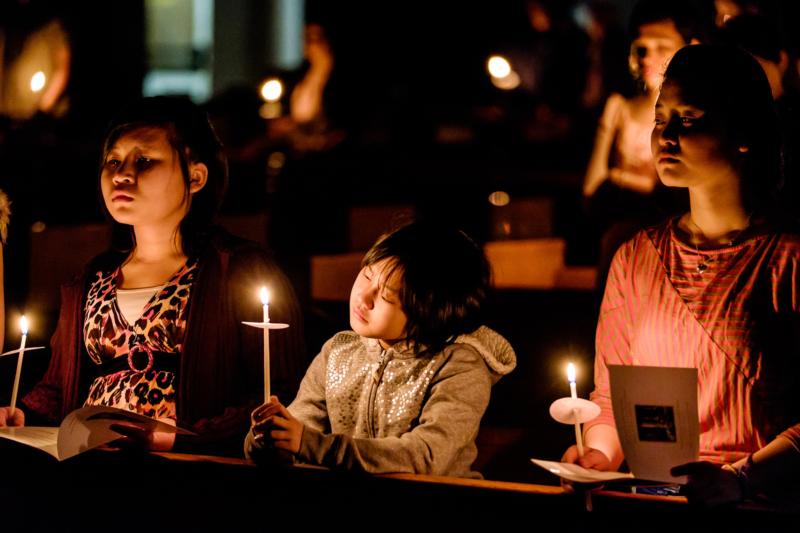As a country, we celebrate Thanksgiving in late November. As a church, we celebrate Thanksgiving every Sunday or every time we go to Mass.
And never more so than on the holiest of all days, Easter Sunday, as we are reminded in the opening of the Easter sequence: “Christians, to the Paschal Victim / Offer your thankful praises!”
This, like much of the teaching of the church, can be a challenge when we look at the world around us: conflict, violence, terrorism, poverty, oppression, economic injustice, ecological abuse, family discord, social upheaval — and arguments, judgments, castigations, fault-finding and blame-casting that never seem to end.
[hotblock]
Didn’t Pope Francis declare this a Year of Mercy? A year in which to focus on being loving and compassionate? A year in which we listen to one another?
“We need constantly to contemplate the mystery of mercy,” the pope said in “Misericordiae Vultus,” his document that officially proclaimed the Holy Year of Mercy that began last Dec. 8. Mercy “is a wellspring of joy, serenity and peace,” he said. “Our salvation depends on it.”
Yes, our salvation depends on it — on offering to one another the mercy that Christ himself offered to those who put him to death: “Father, forgive them.”
“At times how hard it seems to forgive!” Pope Francis admits in “Misericordiae Vultus.” “And yet pardon is the instrument placed into our fragile hands to attain serenity of heart. To let go of anger, wrath, violence and revenge is a necessary condition to living joyfully.”
This is a tall order for most of us, who — and not always without good reason — allow ourselves to be consumed with anger and the desire for “getting even” based on hurts or injustices cast our way: an overbearing boss, a disgruntled employee, an obstinate child, an irresponsible neighbor — the list goes on.
[tower]
And very often at the root of our anger is the belief (again, often justified) that we are not properly appreciated — i.e., thanked — for who we are and what we have done for the one persecuting us. “What about all that I …?” “What about the time I …?” “Did he forget about …?”
In times like that, it’s a good idea go back to Jesus on the cross and especially the people who put him there and then stood around the cross, jeering and castigating him. What about all that Jesus did for the people? What about the times Jesus healed their family members and relatives? Did they forget about Jesus’ message of forgiveness?
Did they even thank him? Do we?
The readings of the Easter Vigil, by their sheer length and number, cover a lot of theological territory, but each of them offers something significant for us in terms of what it means to be merciful and thankful.
The first three readings alone — the story of creation, the granting of favor to Abraham, the deliverance of the Jews from slavery — provide powerful moments for meditation and reflection on God’s mercy and how we are called to do likewise, in praise and thanksgiving.
So do the responsorial psalms: “The earth is full of the goodness of the Lord” (Ps 33); “You will show me the path to life” (Ps 16); “Let us sing to the Lord” (Ex 15).
And in the fourth reading, Isaiah declares: “Though the mountains leave their place and the hills be shaken, my love shall never leave you nor my covenant of peace be shaken, says the Lord, who has mercy on you” (Is 54:10).
[hotblock2]
To which the psalmist responds: “I will praise you, Lord, for you have rescued me. Sing praise to the Lord, you his faithful ones, and give thanks to his holy name. For his anger lasts but a moment; a lifetime, his good will” (Ps 30).
Most of the time, we must admit, our anger — however justified — lasts a great deal longer than a moment, and letting go of anger — forgiving those who angered us — is not easy. Nor is substituting that anger with giving thanks to God.
Yet that is what being a disciple of the Lord means, allowing the love that is placed into our hearts by God to be shared with all we encounter.
In “Misericordiae Vultus,” Pope Francis hopes that on the last Sunday of this liturgical year, on the solemnity of Christ the King (Nov. 20), “we shall be filled above all with a sense of gratitude and thanksgiving to the most Holy Trinity for having granted us an extraordinary time of grace. We will entrust the life of the church, all humanity and the entire cosmos to the lordship of Christ, asking him to pour out his mercy upon us like the morning dew, so that everyone may work together to build a brighter future.”
In raising Christ from the dead, God performs his ultimate act of mercy upon the world, an act for which we give thanks not only at Easter but at every celebration of the Mass.
Or, as the Easter sequence concludes: “Christ indeed from death is risen, our new life obtaining. Have mercy, victor King, ever reigning! Amen. Alleluia!”
***
(Nelson is former editor of The Tidings, newspaper of the archdiocese of Los Angeles.)




Share this story